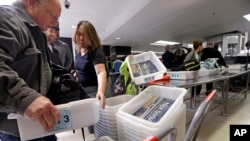The U.S. Transportation Security Administration is boosting security measures by requiring any carry-on electronics larger than a cellphone to be screened separately at U.S. airports.
Security officers will ask travelers to take all larger devices out of their bags and put them in a bin by themselves, similar to the screening of most travelers' laptops, TSA announced Wednesday.
'An increased threat'
TSA cited an “an increased threat to aviation security” as the reason for the move. The change will not apply to PreCheck lanes.
The new rule eliminates one benefit of leaving laptops at home and traveling with a tablet. In the past, travelers weren't required to fish out those smaller electronics from their carry-on bags to be X-rayed.
In May, the TSA said it was going to test additional screening measures for tablets at 10 U.S. airports. That pilot program was successful and the agency said it planned to expand the rules nationwide “during the weeks and months ahead.”
Worried about laptops
Airlines for America, a trade group representing American, Alaska, Atlas, Federal Express, Hawaiian JetBlue, Southwest, United and UPS airlines “remain committed to working collaboratively with DHS officials to strike the appropriate balance of maintaining the efficiency of the system, while ensuring the highest levels of security are in place.”
The threat of terrorists hiding explosives in laptops prompted the Department of Homeland Security in March to ban electronics larger than cellphones in carry-on bags on direct flights of nine airlines at 10 Middle East airports to the U.S. That ban has since been lifted as each of the airlines tightened its screening.
John Kelly, the secretary of Department of Homeland Security, then announced tighter security for all 180 airlines flying directly to the U.S. from 280 airports worldwide. The measures that went into effect July 19 applied to 325,000 passengers on 2,000 daily flights.





